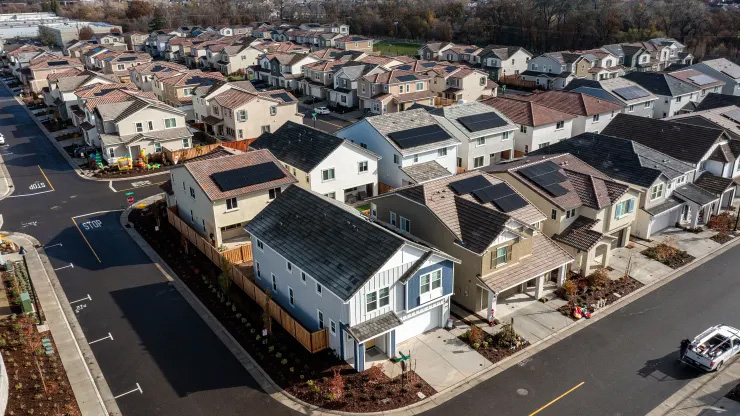Homebuyer applications for purchase mortgages rose 5% last week, but a strong jobs report and ongoing bank instability are pushing mortgage rates back up
Homebuyer demand for purchase loans jumped last week as mortgage rates eased on hopes that the Federal Reserve is done raising rates.
But mortgage rates have been climbing again this week after a strong April jobs report cast doubts on expectations that the Federal Reserve could begin rolling back rate hikes later this year to ward off a recession.
After adjusting for seasonal factors, applications for purchase mortgages were up 5 percent last week compared to the week before, according to a weekly survey of lenders by the Mortgage Bankers Association. Looking back a year, applications for purchase loans were down 32 percent.
The MBA survey found demand for refinancing spiked 10 percent last week compared to the week before but was down 44 percent from a year ago.
“Mortgage applications responded positively to a drop in rates last week, as the Fed signaled a potential pause at the current level for the federal funds rate in anticipation of inflation slowing and tightening financial conditions that will slow economic and job growth,” said MBA Deputy Chief Economist Joel Kan in a statement. “Lower rates from week to week have helped buyers in the market, but limited for-sale inventory remains a challenge for many homebuyers.”
The Optimal Blue Mortgage Market Indices, which track daily ups and downs in mortgage rates, show rates on 30-year fixed-rate conforming mortgages dipped as low as 6.32 percent last week. That’s more than half a percentage point below a 2023 peak of 6.84 percent registered on March 8.
But that was before the publication of Friday’s strong jobs report, which shows that the U.S. added a seasonally adjusted 253,000 jobs in April, pushing the unemployment rate down to 3.4 percent. That’s good news for anyone worried about the prospects of a recession, but bad news for those hoping for lower mortgage rates. By Tuesday, rates on 30-year fixed-rate mortgages had climbed 13 basis points, to 6.45 percent.
Ongoing banking instability sparked by the failures of Silicon Valley Bank and Signature Bank means rates for jumbo mortgages not eligible for purchase by Fannie Mae and Freddie Mac have climbed more steeply.
The MBA’s Mortgage Credit Availability Index, which tracks underwriting criteria for over 95 lenders, shows mortgage credit availability declined in April to the lowest level since January 2013, “reflecting the tightening in broader credit conditions stemming from recent banking sector challenges and an uncertain economic outlook,” Kan said.
Economists at Fannie Mae are forecasting that mortgage rates will decline for the rest of this year on the likelihood that the U.S. will enter a “modest recession” in the second half of the year. But if a recession doesn’t materialize and inflation doesn’t cool, Fannie Mae forecasters warn that there’s the possibility of another jump in mortgage rates.
While a recession is by no means certain, a key inflation metric eased for the 10th consecutive month in April. At 4.9 percent, the consumer price index has retreated to levels not seen since April 2021, the Bureau of Labor Statistics reported Wednesday.
Speaking at the National Association of Realtors’ midyear conference in Washington, D.C., Tuesday, NAR Chief Economist Lawrence Yun was critical of the Federal Reserve’s May 3 rate hike, which brought the federal funds rate to a target range of 5.0 to 5.25 percent.
“They should not have done that,” Yun said. “The latest figure is that inflation is at 5 percent — not yet 2 percent, but moving in the right direction.”
While Federal Reserve Chair Jerome Powell acknowledged last week that the Fed may be done raising rates, he’s not ready to start talking about bringing them back down.
Futures markets tracked by the CME FedWatch Tool show bond market investors see a better than even chance that Fed policymakers are done hiking rates and will reverse course and start lowering rates in September to head off a recession.
For the week ending May 5, the MBA reported average rates for the following types of loans:
- For 30-year fixed-rate conforming mortgages (loan balances of $726,200 or less), rates averaged 6.48 percent, down from 6.50 percent the week before. With points decreasing to 0.61 from 0.63 (including the origination fee) for 80 percent loan-to-value ratio (LTV) loans, the effective rate also decreased.
- Rates for 30-year fixed-rate jumbo mortgages (loan balances greater than $726,200) averaged 6.33 percent, down from 6.37 percent the week before. With points decreasing to 0.51 from 0.54 (including the origination fee) for 80 percent LTV loans, the effective rate also decreased.
- For 30-year fixed-rate FHA mortgages, rates averaged 6.41 percent, down from 6.34 percent the week before. With points decreasing to 1.01 from 1.02 (including the origination fee) for 80 percent LTV loans, the effective rate also decreased.
- Rates for 15-year fixed-rate mortgages averaged 5.91 percent, down from 6.01 percent the week before. Although points increased to 0.58 from 0.55 (including the origination fee) for 80 percent LTV loans, the effective rate also decreased.
- For 5/1 adjustable-rate mortgages (ARMs), rates averaged 5.35 percent, down from 5.48 percent the week before. With points decreasing to 0.79 from 1.14 (including the origination fee) for 80 percent LTV loans, the effective rate also decreased.
Source: inman.com













